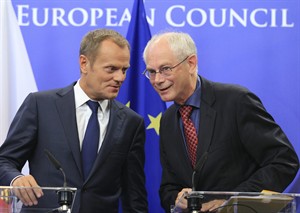
EU looking to give existing sanction more bite rather than expand penalties to new sectors
BRUSSELS – European Union nations will be looking to give existing penalties against Russia more bite by the weekend rather than expanding sanctions to include sport events to punish Moscow for its involvement in the Ukraine crisis.
Several member states came out on Wednesday against the idea of taking action against Russia’s high-profile sports events, such as its hosting of the 2018 World Cup, describing it as unrealistic at this stage.
The EU’s executive Commission said in a statement that it offered proposals to the 28 member states to complement sanctions and centre on “access to capital markets, defence, dual use goods, and sensitive technologies.”
It would leave the member states to primarily toughen existing measures. The proposals will now be considered by member states and a decision is expected by late Friday.
The EU and the United States have so far imposed penalties against dozens of Russian officials and the financial and arms industry.
On Wednesday, the bloc’s officials were looking at whether a ceasefire discussed by Ukrainian President Petro Poroshenko and Russian President Vladimir Putin would materialize, but there was no immediate indication that the fighting would stop.
The idea of sports sanctions briefly came up but could not gain swift acceptance among many member states. Such sanctions against nations have often been fraught with difficulty and German Chancellor Angela Merkel’s spokesman, Steffen Seibert, sounded skeptical about any such move for the World Cup.
“It is now 2014, the World Cup will happen in 2018, so I don’t think that this is something we have to discuss here today,” he said.
Soccer governing bodies FIFA and UEFA have both declined to punish Russia despite apparent breaches of their rules in recent weeks, including the Russian Football Union’s attempt to integrate clubs from Crimea, which Moscow annexed in March, into its competitions.
___
Graham Dunbar contributed from Geneva, Geir Moulson from Berlin.
___
Raf Casert can be followed on Twitter at http://www.twitter.com/rcasert
Join the Conversation!
Want to share your thoughts, add context, or connect with others in your community? Create a free account to comment on stories, ask questions, and join meaningful discussions on our new site.














Leave a Reply
You must be logged in to post a comment.